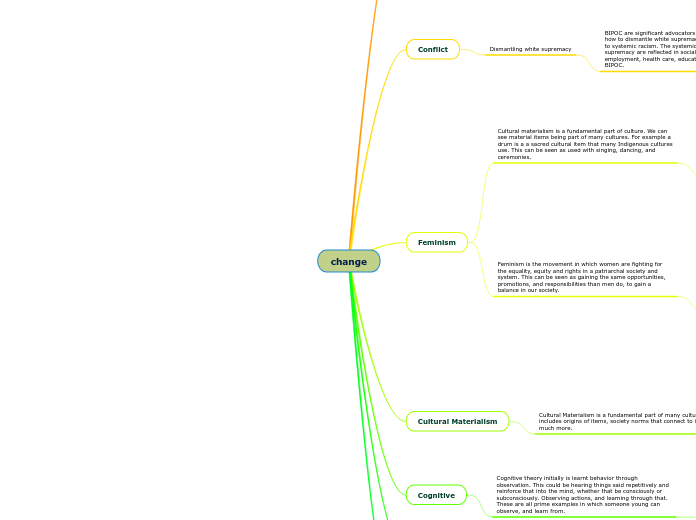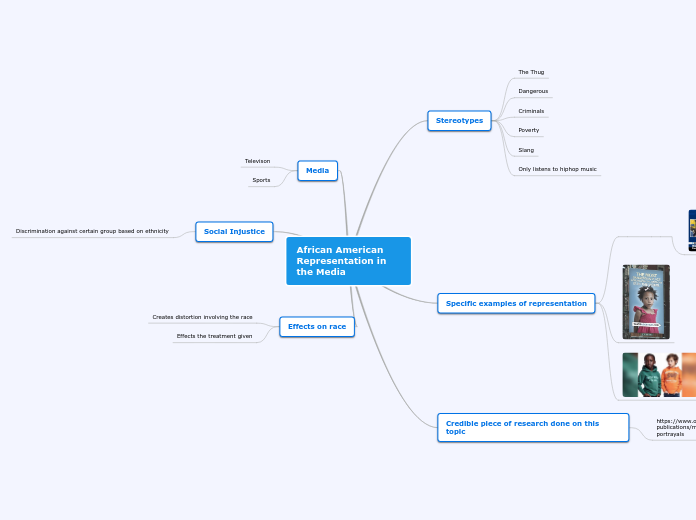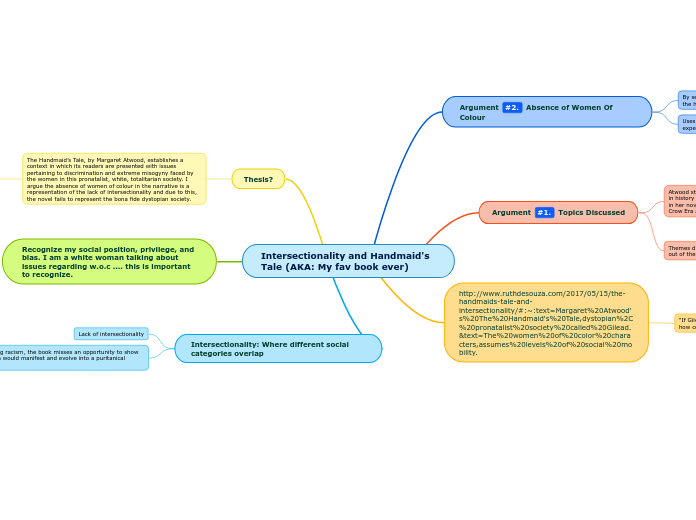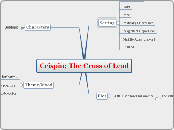change
Intersectionality
Intersectionality is when you are able to have an understanding of how the combinations of race, gender, and class interconnect. Thus, creating systems of discrimination, classism, and other forms of privilege pertaining to these sections.
To put intersectionality at place right now, I am going to provide some examples I have seen through the media on Palestine and Israel and how intersectionality can be at force with ally's in other countries.
Many cis white gay males have spoken up on social media that they were for the movement of free Palestine, until they found out that the lgbtq+ people don't have their rights, and are consequently oppressed because of that. The issue that I noticed with this, is that first off the men saying this are living in western countries like America, and some in Canada. Not only do they have white privilege but also being cis and male in a patriarchal society. Instead of trying to understand the oppression that is happening with the Palestinians, in the sense that they can have a intersectional point of view, thus having them still being able to support the movement of free Palestine. I say to have an intersectional point of view, because people who are Palestine and lgbtq+ are dying at the hands of settler colonialism, and to just disregard that ignore that even lgbtq+ Palestinians are dying at the hands of Israel just because there is one flaw that pertains to their personal identity, is when intersectionality can come in and work. Which is the basis of it, which is being able to be intersectional and have understanding. This is how intersectionality has the ability to change peoples point of views, it all starts with looking at all the forms of oppression happening.
Humanism
Humanism is a theory which is looked through the lenses of individually and socially. This can be emphases and seen on recognizing and attending humans needs, and values.
To reference personal experience I have encountered that connects to the theory of humanism was when I had other priorities that needed to be done, but I focused on my mental health first. This would be seen as individual because I need to take care of my personal human needs. Humanism changes which is dependent upon the individual, for their personal humans needs might not be the same for the next person.
Cognitive
Cognitive theory initially is learnt behavior through observation. This could be hearing things said repetitively and reinforce that into the mind, whether that be consciously or subconsciously. Observing actions, and learning through that. These are all prime examples in which someone young can observe, and learn from.
The most recent observation I have learnt was during school, when students engaged in talking whether that be debates on topics, or sharing their opinions, more people tend to talk. Opposed to when only one person would share their opinion, the class was less likely to enagage. But when around the 3 personshared, the class seemed to be more enggaged.
I believe this to be that when more people talk, it creates a more comfortable environment and people learn that it is okay to share their views. Which connects to psychology and cognitive, as one observes the situation and acts on it when they feel like it's comfortable for them. Meaning when 1 or no one engaged, the environment for students to talk seemed more intimidation, but once 3 or more shared it began a cycle of more students want to share.
Cultural Materialism
Cultural Materialism is a fundamental part of many cultures it includes origins of items, society norms that connect to it and much more.
An example of a cultural material item we can see that has a long history but is still very present in Indigenous cultures is a drum. The drums connects to a sociocultural term, as it combines the society to a cultural item. This means that the drum really influences people to come together. Such as having a powwow, ceremonies, singing, dancing, and times of mourning. It can be seen to represent a culture of community and connectedness. The drum plays a significant part in the culture as there are many teachings on being community oriented and values that, which the drum influences that in a cultural social setting.
Feminism
Feminism is the movement in which women are fighting for the equality, equity and rights in a patriarchal society and system. This can be seen as gaining the same opportunities, promotions, and responsibilities than men do, to gain a balance in our society.
The society we live in still upholds the patriarchy which is connected to why feminism had to exist in the first place. An example that can be seen in our modern society is when women experience sexual violence and harassment at very high levels. In Canada women reported 553,000 sexual assaults in 2014 according to the Canadian woman's foundation. The sexualization of women and sexual violence against women is rooted in a patriarchal system, gender inequality, and misogyny.
To continue how feminism changes on a a sociological level, is that before feminism wasn't really for all women's right to vote nor did it include ALL women. This was a racist policy that only white and black could have a right in voting. When Indigenous women unless the relinquished their Indian status, they were denied suffrage until 1960. as well as Asian women who were not granted suffrage until 1948. This is feminism changing, as before it wasn't inclusive and in 2021 we can now understand that feminism is for all women. Was feminism for all women back then? I beg to differ, but now feminism has changed to create a more equal including movement. Which is why I mentioned earlier, that almost everything in our society is intertwined with racism, and racist policies. However movements change which we can see, that all women now do have the right to vote in 2021 if you are a citizen.
Misogyny is an indoctrination belief system that men can hold, as well as women which would be seen as internalized misogyny. Since our society is always learning and growing. Feminism is a good movement, however it changes and adapts to our society. The way I can mention how feminism changes in when only white women and some black women got to vote the right to vote by the federal government in the limited war time suffrage in 1917. Then by 1918, full suffrage and then around 1922, except Quebec had all the province's were all granted the right to vote for women who were only white and black.
Cultural materialism is a fundamental part of culture. We can see material items being part of many cultures. For example a drum is a a sacred cultural item that many Indigenous cultures use. This can be seen as used with singing, dancing, and ceremonies.
This can be represented as sociocultural, as it combines the society norms of Indigenous people which would be seen as community oriented, and the values in our culture and society is to be connected. The culture materialism like a drum, really influences that all people come together and enjoy. Like an instance that most know would be a powwow, all the singers sit around the big drum and sing. While the dancers dance and the community all come together and talk, eat and catch up with family members they haven't seen in awhile, this creates a sense of connectedness.
Conflict
Dismantling white supremacy
BIPOC are significant advocators for voicing statements on how to dismantle white supremacy when it inherently connects to systemic racism. The systemic racism, and white supremacy are reflected in social, economic, political systems, employment, health care, education, and incarceration rates of BIPOC.
The reason for conflict is that it has been recognized, experienced, and fundamentally imbedded in our society. This is what causes a balance of inequality, and racism.
The goal of advocators is to call out systemic racism, and white supremacy. This does in fact create conflict, as many politicians and leaders and leaders willfully have a biased ignorant perspective as many believe systemic racism does not exist. This creates more division and an imbalance of "power". By this I mean if people are actively dismissing systemic racism, this continues to uphold white supremacy and systemic racism. While also silencing BIPOC voices simultaneously.
The change is our society is that many people are finally becoming educated on this, and understanding how and why it affects BIPOC. However, as I mentioned not everyone will do so in educating themselves on it, which is why there is conflict, and change will be the resolution.
For this reason, this is why there are advocators and justice speakers. The people who do this are attempting to change the systems to create a society that is aware and educated on systemic racism and how white supremacy are intertwined.
Structural Functionalist
psychological
Institutions like social media, and education all meet and uphold the standards of a society. It gives goals, and achievements. Humans are constantly growing, and learning. These two institutions offer the requirements of what a human will need to benefit psychologically. By this I mean give them new information on things they did not know before.
apps like tiktok, give off dopamine and depending on what videos are liked, it creates a personalized for you page. This means you'll only see videos you'd agree on. This can cause change in belief systems in an overall society.
Social media
Creates trends and movements
Information gets passed on quicker, which can creates change in a way society perceives news based on who they're getting the information from.
creates change, based on other peoples views and opinions.









